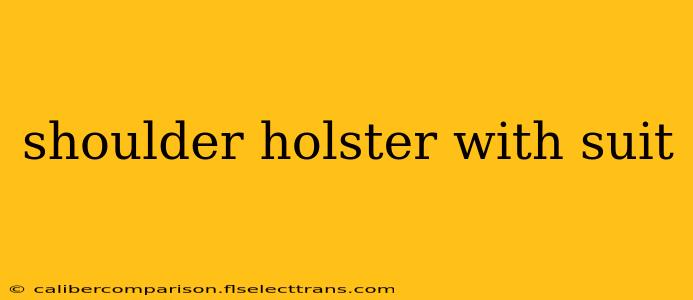For professionals who value both personal safety and a polished appearance, the question of how to discreetly carry a firearm while wearing a suit is paramount. A shoulder holster offers a potential solution, but its implementation requires careful consideration and a nuanced understanding of both concealed carry and sartorial elegance. This guide will explore the practicalities and aesthetics of carrying a handgun in a shoulder holster under a suit, ensuring both safety and a professional image.
The Practicalities of Concealed Carry with a Suit and Shoulder Holster
Choosing the right shoulder holster is crucial. A poorly designed holster can print (show the outline of the firearm under clothing), be uncomfortable, or even compromise the safety of the firearm itself. Key considerations include:
Holster Material and Design:
- High-Quality Leather: Genuine leather holsters offer superior comfort, durability, and breathability. They also tend to mold to the body over time, enhancing concealment.
- Concealment Features: Look for holsters with features specifically designed to minimize printing, such as a close-fitting design and sweat-guard to prevent the firearm from rubbing against your skin.
- Retention: A secure retention system is non-negotiable. Avoid holsters with loose retention, as this can lead to accidental discharge. Consider holsters with a thumb break or similar safety mechanism.
- Adjustability: The ability to adjust the holster's position and cant (angle) is critical for optimal comfort and concealment under a suit jacket.
Suit Selection and Fit:
The suit itself plays a critical role in successful concealed carry. A well-tailored suit is your best ally.
- Fabric Weight: Heavier fabrics, like worsted wool, offer superior concealment compared to lighter materials.
- Cut and Fit: A suit that fits properly will help to conceal the holster and firearm more effectively. Avoid suits that are too tight or too loose, as both can hinder concealment and comfort.
- Jacket Length: A longer jacket will generally offer better concealment than a shorter one.
Gun Choice:
The firearm you choose significantly impacts the feasibility of concealed carry in a shoulder holster with a suit. Smaller, compact handguns are generally preferable. Consider factors such as:
- Size and Weight: A smaller, lighter handgun will be more comfortable and easier to conceal.
- Caliber: Balance concealability with stopping power. Consider the trade-offs between a larger caliber with less capacity versus a smaller caliber with higher capacity.
The Aesthetics: Maintaining a Professional Image
Carrying a concealed firearm shouldn't compromise your professional appearance. Here's how to maintain a polished image:
- Proper Garment Care: A well-pressed suit is essential. Wrinkles can draw unwanted attention to the area where the holster is located.
- Body Posture: Maintaining good posture will help to conceal the firearm and create a more confident and professional appearance.
- Color Coordination: Choose a holster that is as close in color as possible to your suit jacket to minimize visibility. Black or dark brown are generally good choices.
Safety First: Training and Practice
Successful concealed carry requires comprehensive training.
- Firearm Safety: Thorough firearm safety training is paramount. Understanding gun handling, proper holstering techniques, and safe gun storage is non-negotiable.
- Draw Practice: Practice drawing your firearm from the shoulder holster smoothly and efficiently under controlled conditions. This will build confidence and improve your response time in an emergency.
- Legal Considerations: Familiarize yourself with all applicable laws and regulations concerning concealed carry in your jurisdiction.
Carrying a concealed firearm in a suit requires careful planning, preparation, and a commitment to safety. By choosing the right holster, suit, and firearm, and by prioritizing training and awareness, professionals can maintain a professional image while prioritizing their personal safety. Remember, consulting with experienced firearms instructors and tailoring your choice to your body type and specific needs is crucial for comfortable and effective concealed carry.

